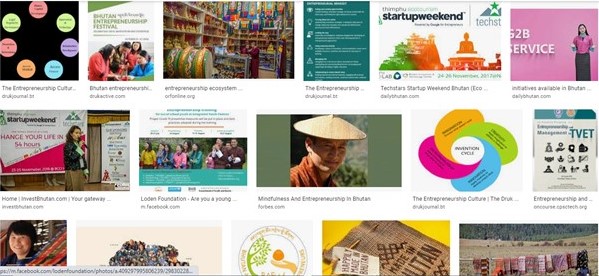
Entrepreneurship in Bhutan
Background & History
Officially known as the Kingdom of Bhutan, is a landlocked country in the Eastern Himalayas, with China to its north, India to its south and east and Nepal to its west. Bhutan is a constitutional monarchy with a population of approximately 750000 and a land area of 38394 square kilometres. Thimpu is the capital and the largest city of Bhutan. With many peaks over 7000 meters above sea level, the Gangkhar Puensum is the highest peak in Bhutan and remains as the highest unclimbed mountain in the world. Bhutan is rich in its biodiversity, with approximately 70% of the country in forest cover, enabling it to be the only country in the world to be carbon negative.
Economy
Bhutan’s economy is dependent on Agriculture, Forestry, Tourism and Hydroelectric power which is mainly sold to India. The industrial sector is generally dominated by small cottage industries that manufacture handicrafts. Large industries are being set up in the area of steel, cement and ferroalloys.
Bhutan was a closed economy, it only opened up to tourists in 1974 in order to generate more revenue for the economy and to promote its culture and traditions. To keep check on the environmental impact due to tourism, the government imposes a daily fee on tourists to attract only high value and limited number of tourists. Also, television was banned in the country, lifting the ban in 1999 making it the last country to introduce television. The reforms have led to Bhutan maintaining strong economic, strategic and military relations with India. It has diplomatic relations with 53 countries and the European Union. India, Bangladesh and Kuwait have residential embassies in Bhutan, other countries maintain informal diplomatic relations through their embassies in New Delhi and Dhaka.
Bhutan is ranked first in the SAARC in economic freedom, ease of doing business and lack of corruption in 2016. It is ranked 3rd in South Asia after Sri Lanka and Maldives in the Human Development Index in 2020. Bhutan’s currency is ngultrum and its value is fixed to the Indian Rupee. The Indian Rupee is also accepted as a legal tender in Bhutan. India is also a major trading partner to Bhutan, accounting for approximately 60% of Bhutan’s exports. The government measures its success more in terms of GNH which stands for Gross National Happiness, than the traditional GDP methodology.
Entrepreneurship and Startups
Bhutan has seen growth in the Technology sector with green tech and e-commerce initiatives. Thimpu Tech park plays a significant role in nurturing and young entrepreneurs by incubating them through the Bhutan Innovation and Technology Centre. As of 2019 Ease of Doing Business ranking, Bhutan ranks 89 among 190 countries. With the launch of its G2B portal Bhutan has become the fastest place in the world to start a small business, Entrepreneurs can get the business registered on phone in less than a minute without any cost. The portal uses UNCTAD’s online single window technology, which is operational in ten other countries, speeding up the business registrations and cutting red tape and administrative roadblocks during business registration processes. Rajini Tamang is the first entrepreneur to use the portal and register her business – Home Basics and Interiors which is involved in recycle and reuse of wood waste into toys, utensils and items of home decoration.
The World Bank through its Youth Employment and Rural Entrepreneurship (YERE) project is helping those affected economically by the Covid-19 pandemic. The current government has launched the NU 1.2 Billion CSI and Startup initiative, which is encouraging industry and startup creation that leads to job creation and replace 10 imported products by the end of 2023. The Loden Entrepreneurship Program started in 2008 supports aspiring entrepreneurs through interest and collateral-free loans.
The government of Bhutan has also set its eyes on the trending Digital Currency or Crypto Currency revolution. Until the 1950s cash use to be a relatively new construct in Bhutan, people kept bartering in rice, butter, cheese, meat, wool, and hand-woven cloth. Salaries were accepted in commodities. In 2020, the Royal Monetary Authority announced a pilot with San Francisco-based Ripple for a national currency running on distributed electronic account-keeping.
Environmental consciousness is ingrained in the Bhutanese culture, that most entrepreneurial ventures are inclined towards doing environmental good, one such venture is Bhutan Alternatives founded by Leki Dawa, specialising in collecting used printer cartilages refurbishing them for resell. It also is the first company in raising funds through an online crowd funding campaign.
In terms of the role of women in entrepreneurship in Bhutan, approximately 35.53 percent of the total registered micro, small and medium enterprises in the country were owned by women. One would normally find them in to trading activities. However, this is changing with the first female owned Food processing company Tshejor’s Ayzey launched by Tshewang Dema.
Conclusion
Bhutan can be the game changer in Entrepreneurship by focusing on sustainability and environmentally friendly ideas to startup with. With the covid-19 pandemic changing the way people work and live and also the way life will resume to normalcy post pandemic, Bhutan can make a prominent place in terms of the way businesses are set up and run to ensure sustainability for all.
References
Bhutan Entrepreneurs open a business in under a minute
Supporting Youth Led Entrepreneurship in Bhutan
Bhutan nurturing the Entrepreneurship Ecosystem
Entrepreneurship programs and initiatives in Bhutan
Digital Currency to lift the Gross National Happiness in Bhutan
Bhutan Alternatives – A Story of an Entrepreneur
Women Entrepreneurship in Bhutan